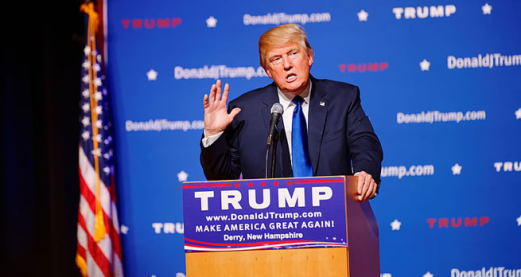 Can he catch her?
Can he catch her?
Never has the phrase "it'll all be over bar the shouting" been more appropriate than when thinking about where we'll be with the US election next week. In the meantime, here's a small dip into the many thousands of pieces being published about the face-off:
As if the shifting of the opinion polls wasn't complicated enough, Nate Silver at FiveThirtyEight explains why it's getting more likely that Hillary could win the most votes, and Donald still wind up as President:
We’ve written about this before, but I wanted to call your attention to it again because the possibility of an Electoral College-popular vote split keeps widening in our forecast. While there’s an outside chance that such a split could benefit Clinton if she wins the exact set of states that form her “firewall,” it’s far more likely to benefit Donald Trump, according to our forecast. Thus, as of early Monday evening, our polls-only model gave Hillary Clinton an 85 percent chance of winning the popular vote but just a 75 percent chance of winning the Electoral College. There’s roughly a 10 percent chance of Trump’s winning the White House while losing the popular vote, in other words.
Will the result swing on which party is better at getting its supporters to the polling booth? Columbia's Donald Green explains the ground game:
In this election, roughly 90 percent of Democrats are for Hillary Clinton, and 90 percent of Republicans are for Donald Trump. The vast majority of registered voters will vote regardless of encouragement by campaigns. So the ground game is about persuading a relatively narrow but decisive slice of the electorate to vote. If you live in a battleground state, which in this election includes Ohio, North Carolina, Pennsylvania and Florida, chances are you will be hearing often from campaign volunteers on behalf of their candidate.
What should Americans be looking for as they stand in front of their voting machines next week? George C Edwards III tries to define the essence of what makes someone fit for that office - and exactly how far their power runs:
Although it may be appealing to explain major policy changes in terms of persuasive personalities and effective leadership style, public opinion is too biased, the political system is too complicated, power is too decentralized, and interests are too diverse for one person, no matter how extraordinary, to dominate. Neither the public nor Congress is likely to respond to the White House’s efforts at persuasion. Presidents cannot create opportunities for change. There is overwhelming evidence that presidents, even “great communicators,” rarely move the public in their direction. Indeed, the public often moves against the position the president favors. Similarly, there is no systematic evidence that presidents can reliably move members of Congress to support them through persuasion.
Read the full article at Oxford University Press: The essence of presidential leadership
The impact of next Tuesday has implications beyond the two shining seas that bookend America. What, for example, are Germans hoping for as America chooses its next leader? Expectations are not high:
Helmut Kopp, 46, is a senior partner in a business consultancy near Frankfurt and is married to a German-Persian woman.
I follow the election closely enough to have watched the first debate live at 3 a.m. I was interested, but there was also an ironic aspect. How should I put this? I've come to see it as a bit of cabaret.
You could see that Trump wasn't prepared and just kept repeating the same platitudes … He's got a lot of explanations, but no answers for how he wants to get things done.
I'm no Hillary Clinton supporter. I think it's pathetic that a population of 320 million people has a choice between a senile old man and 72-year-old woman. The two of them should be preparing for the final years of their lives and not go around pretending to be 50-year-old yuppies … It's the same discussion we had with John McCain [who ran against Obama in 2008 - ed. note], and he's two years younger than these two candidates.
Read the full article at DeutscheWelle: What Germans hope and expect from the US election
Other people who are invested in the vote include Hillary Clinton and Donald Trump. Not those Hillary and Donalds, though. CNN has met people who share the names of the candidates:
Having the name Hillary Clinton on social media isn't always easy. "I get tagged in so many Hillary Clinton posts," Clinton says. "Positive and negative memes and photos."Her Facebook account has been suspended on multiple occasions, with the social network giant thinking her name a fake. She sent Facebook officials her driver's license some years ago but her account was again subsequently blocked. Today, in fact, she goes by "Hill Clinton.""Facebook, if you're listening, I want my name back," she says.
Read the full article at CNN: The Donald Trump and Hillary Clinton not running for president
Some experts believe that we're becoming estranged from politics - in part - because of modern TV services allowing us to cherry pick entertainment and swerve the news. Researchers Jacob Groshek and Sarah Krongard have investigated, and they believe the opposite could be true...:
Online streaming is therefore part of a sea change in the creation and consumption of television. In the last year alone, Netflix reported that its subscribers cumulatively streamed over 42.5 billion hours of content. (This does not take into account the millions of subscriptions to Hulu, Amazon Prime and other services.) But even at this level of viewership, media itself is rarely just “good” or “bad” for democratic politics. And with relatively few studies done so far, it is simply too soon to say whether streaming online TV displaces or enhances civic and political engagement.
This point is especially important in this election season, when the presidential debates were the most-watched political live streams ever and users are streaming more than ever before. Moreover, streaming television itself is also becoming a primary source of original news and political content through apps like Newsy and Local Now.
Our evidence thus leads us to believe that how people access and engage television content is as important as what they watch. We do not argue that streaming television is causing political participation to increase: Our data are too limited to prove that at this stage.
But we do argue that streaming television benefits from a social media logic in a media ecosystem where recommendations, popularity and sharing determine user experiences. People who use communication technologies, namely social media, in this way tend to consistently participate more in civic and political activities.
Therefore, from a political standpoint at least, feel free to binge-watch another episode or series. Odds are that you’ll still participate politically and probably to a greater extent than others who stream less or simply “watch” the news on broadcast or cable television.




Rate and Review
Rate this article
Review this article
Log into OpenLearn to leave reviews and join in the conversation.
Article reviews